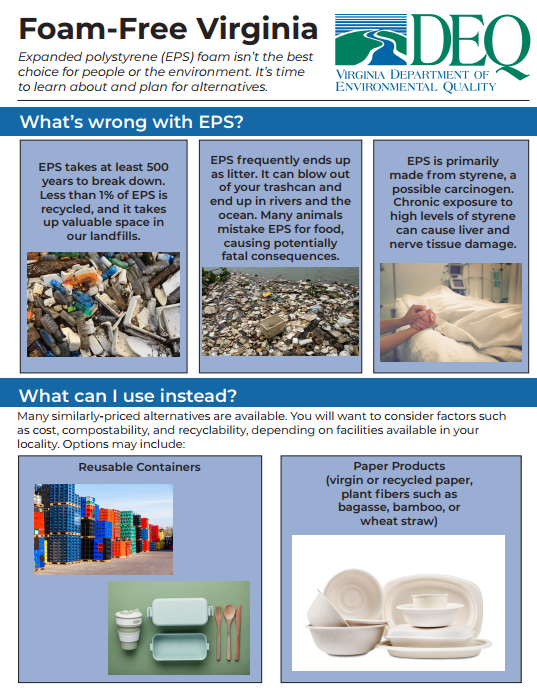The Virginia General Assembly passed legislation in 2021 that will ban the use of Expanded Polystyrene (EPS) by food vendors. The legislation also discourages the sale and use of EPS products and the encourages the promotion of alternatives to EPS.
Currently, the ban is to take effect in two phases. By July 1, 2028, food establishments with 20 or more locations must stop using EPS containers. By July 1, 2030, remaining food establishments must comply.
The ban applies to any food vendors that serve prepared food, including restaurants, cafeterias, food trucks, catering companies, and grocery store salad bars.
For anyone who is currently using EPS products in any industry, the legislation encourages the use of alternative materials.
EPS isn’t the best choice for people or the environment. It’s time to learn about and plan for alternatives.
What’s wrong with EPS?
- EPS takes at least 500 years to break down. Less than 1% of EPS is recycled, and it takes up valuable space in our landfills.
- EPS frequently ends up as litter. It can blow out of your trashcan and end up in rivers and the ocean. Many animals mistake EPS for food, causing potentially fatal consequences.
- EPS is primarily made from styrene, a possible carcinogen. Chronic exposure to high amounts of styrene for extended periods can cause injury to the nervous systems.
What can I use instead?
Many similarly-priced alternatives are available. You will want to consider factors such as cost, compostability, and recyclability, depending on facilities available in your locality. Options may include:
- Reusable Containers
- Paper Products (virgin or recycled paper, plant fibers such as bagasse, bamboo, or wheat straw)
- Recyclable Plastic (polyethylene terephthalate, or PET)
- Foil or Metal
An extensive Reference Guide of alternative materials to EPS was published by New York State’s Department of Environmental Conservation.
Information for Localities
For localities looking to implement strategies to discourage the use of EPS and to promote alternatives, some strategies are listed below.
- Print and distribute flyers, pamphlets, fact sheets, infographics, FAQ sheets, and other campaign materials
- Provide example products to businesses that are made from alternatives to EPS
- Meet with local business owners from industries that are more reliant on EPS products, such as food vendors and packaging companies
- Confer with industry, civic, and environmental leaders and organizations on best strategies
- Share ideas and materials with other localities and the DEQ
- Take inspiration from EPS campaigns performed in other states or localities, such as Maryland, New York, or DC

